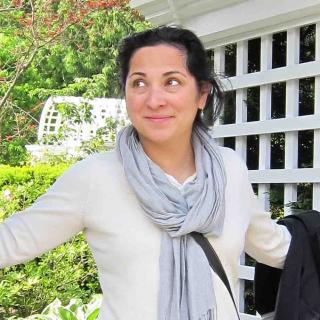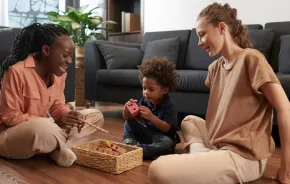 While summertime may give kids a needed break from school, the need to stay active and engaged never goes on vacation. Any time after the turn of the new year is actually time to start making plans for summer camp! Here are some hints on finding just the right one, from tiny preschoolers to tricky teens.
While summertime may give kids a needed break from school, the need to stay active and engaged never goes on vacation. Any time after the turn of the new year is actually time to start making plans for summer camp! Here are some hints on finding just the right one, from tiny preschoolers to tricky teens.
Is my child ready for summer camp?
Kids are ready for day camp when they can make friends, interact cooperatively with peers and follow instruction from adults. Overnight camp tends to be for kids who have spent nights away from home without incident and can “bounce back” when their routine changes.
What types of camps are there?
It’s quite possible to find a camp for every interest. From traditional nature or horseback riding to all kinds of sports (even curling, fencing or table tennis), from religion-focused to math & science or dance, from drumming to Legos, and gardening, rock climbing, circus & trapeze and even barista camp (for teens), the possibilities are endless. There are also local organizations that facilitate camps like the YMCA, city parks and recreation departments, Boys and Girls Clubs, community centers, places of worship and locations that cater to kids like play gyms and Woodland Park Zoo and Pacific Science Center.
How much does summer camp cost?
Price varies greatly depending on session length and activities offered. Parents surveyed reported that, on average, day camps can cost anywhere between $150–$200 a week for parks and rec or YMCA programs to $300 a week and much more for sports, specialty or academic camps. Overnight camps generally range from $600–800 per week.
 What about accreditation?
What about accreditation?
For overnight camps especially, check on the American Camp Association (ACA) website to see if a camp is accredited and for how long it has been. Chelsea Hendrikx, the Evergreen Field Office Executive for the ACA, explains: “An accredited camp has gone through an in-depth process of making sure the camp complies with up to 250 standards in health, safety, and program quality. [It’s] evidence of a camp’s commitment to providing the best and safest experience for your child.”
What is camp staff like?
The ACA recommends a minimum “camper to supervisor” ratio of 1:5 up to age 5; 1:6 for ages 6–8; 1:8 for ages 9–14; and 1:10 for ages 15–18. Be sure to find out the ratio of campers to direct supervisory staff. A camp might say they have a 1:2 or 1:3 ratio, but this could include kitchen, health and administrative personnel. Dr. Christopher Thurber, psychologist, author and camp training professional notes, “Parents routinely neglect to inquire about how the staff are hired and trained. The best camps combine pre-season training and on-site training.”
Considerations by Age
Ages 3–5
Half-day programs are most appropriate for kids in this age range. Some day camps may also offer childcare for preschoolers. Kids of this age need a balance of high- and low-energy activities and plenty of rest time. They will enjoy activities that are tactile, like playing in the pool or at the beach, petting animals or doing craft projects. Full-day camps can start as young as age 5 and are a great way to introduce kids to the summer camp experience.
 Ages 6–10
Ages 6–10
Kids at this age are starting to understand friendship and teamwork. This age group benefits from new experiences as they discover who they are and what they like. Kids are also learning to push their comfort zones, like being in a rustic environment, sharing a room or eating unfamiliar foods. “Generally, most healthy children are ready for overnight camp at [age] 8 or 9. Regardless of a child’s chronological age, he or she still needs proper preparation,” explains Thurber.
There are many guides on the subject of preparation (see “Resources” below). Camp activities for this group might include boating, swimming, hiking, horseback riding, sports & games, arts & crafts, climbing and outdoor skills. This age range is particularly receptive to outdoor nature-themed experiences.
Ages 11–14
At this point, kids are starting to develop a sense of self and individual identity. It’s most important to have opportunities to make choices and take part in decision-making with their group. These kids may want to explore camps with more specialized programs, depending on their interests. Teens may want to attend longer sessions — many camps offer programs that are 10–14 days or longer. Some kids might be more comfortable attending a single-gender camp because there is less pressure to impress anyone and fewer opportunities for distraction. Ideal programs for this age group might include horse camp, outdoor adventure trips (backpacking, rafting, biking, sailing) or an arts, music or science-focused program. There are also some camps that have leadership programs starting at age 13 or 14.
 Ages 14–18
Ages 14–18
Many teen campers will be interested in leadership or staff positions. Some camps will even hire at age 16 or facilitate leadership development programs, like Counselor-In-Training. Leadership programs offer great benefits for participants. By increasing confidence, teaching team-building, organization and other skills that are highly sought-after in the workplace, a leadership program provides teens with experience to take into the job market. They also look great on college applications and resumes. More specialized programs are recommended for teens who may have already done the “camp thing” for years.
Making the final decision
For all ages, it’s important to include your child in the decision to go to camp. Go through brochures and websites together, and encourage your kids to ask questions and find out what appeals to them. If you can, go to an open house or camp fair.
Parents surveyed for this article mentioned that cost, reputation, staff enthusiasm and camp activities were the most important factors in choosing a camp for their children. The ACA’s own research shows that 74% of campers reported trying new activities, and 63% of parents say that their child continues new activities learned at camp after they return home, which is beneficial at every stage of development.
Resources
American Camp Association (lots of general info plus Camp Finder tool)
Online Guide: Summer Camp Handbook, by Jon Malinowski & Christopher Thurber
(Sources: Carrie Kishline, Summer Camp Director at Camp Sealth, Dr. Christopher Thurber, board-certified clinical psychologist & author and Chelsea Hendrikx, Field Office Executive for ACA, Evergreen.)











